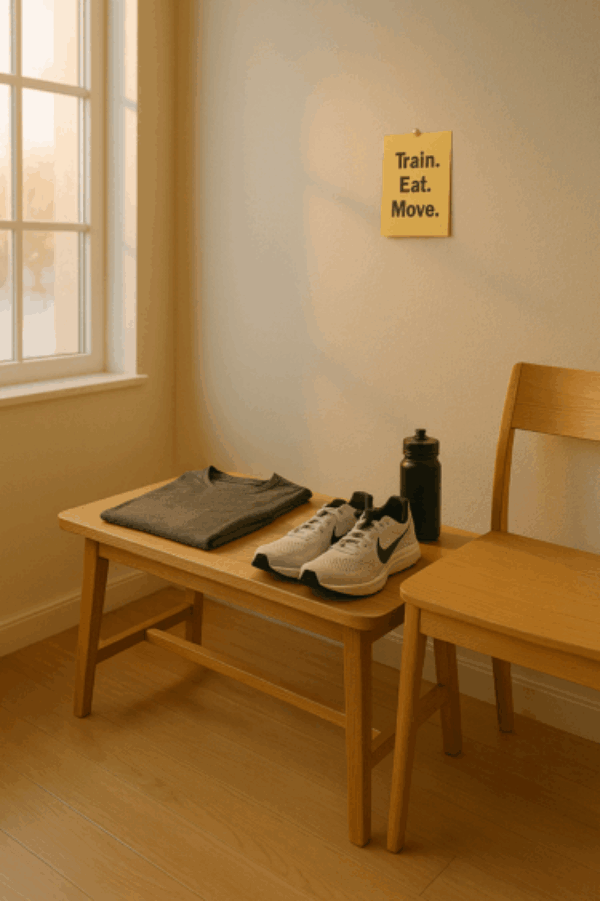“Where did my motivation go?”
Winter has a way of testing your commitment. The alarm clock rings, but it’s pitch black outside. Your room is cold, your body stiff, and that earlier promise to “train every morning” suddenly feels negotiable.
It’s in these moments that people start to ask the wrong question: “Where did my motivation go?”
But the truth is, motivation was never meant to stick around. It’s not a constant, it’s a spark. A catalyst. Something that gets you started, but rarely something that keeps you going.
What really carries you through the dark mornings, the cold weather, and the low-energy days isn’t motivation.
It’s discipline.
Understanding the Nature of Motivation
Motivation often feels magical. One day you’re ready to conquer the world, and the next you can’t even convince yourself to roll out of bed. That’s because motivation is emotional—it ebbs and flows depending on how you feel, what’s happening in your life, and even the weather outside.
It’s also important to understand the type of motivation you’re relying on. There’s extrinsic motivation—the kind that’s driven by rewards, appearance, or recognition. It might get you to the gym in time for summer or keep you on track before an event. But once the reward is gone, so often is the drive.
Then there’s intrinsic motivation. This comes from within, rooted in who you want to be, how you want to live, and the values that matter most to you. It’s deeper. It lasts longer. But even intrinsic motivation isn’t always enough on its own. Because you can deeply value your health and still not feel like training some days.
That’s where discipline comes in.

Discipline: The Real Engine Behind Consistency
Discipline doesn’t rely on how you feel. It’s not flashy or loud. It’s the quiet decision to act in alignment with your goals, even when you don’t want to. It’s what you fall back on when motivation has taken the day off.
But discipline isn’t about being a machine. It’s not about pushing through pain or burnout. True discipline is about creating an environment and structure that supports the actions you want to take. It’s about building a system that reduces friction and reinforces the identity you’re trying to embody.
When you understand this, winter doesn’t feel like a threat. It becomes an opportunity to prove to yourself that your commitment doesn’t change just because the temperature does.
Start With Standards, Not Just Goals
Many people make the mistake of setting vague goals: “I want to stay fit,” or “I should move more.” But these don’t give your brain or body anything to anchor to. Instead, think about the standards you hold yourself to.
Ask yourself: What kind of person do I want to be through winter? Maybe it’s someone who trains even when it’s uncomfortable. Someone who values strength, mobility, or long-term health over short-term convenience.
When your actions align with that identity, discipline becomes far easier. You’re no longer just chasing an outcome you’re living out a standard.

Keep the Target Small Enough to Hit, Consistently
Discipline doesn’t mean doing the most every day. In fact, the most effective form of discipline is often the simplest.
On your best days, you can go above and beyond. But on your worst days—when energy is low or life gets in the way you still need to win. That’s why it’s important to define a minimum effective dose. It might be 15 minutes of mobility before breakfast. A short breathwork session before bed. A focused walk to clear your head.
These actions might feel small, but they reinforce your identity. They prove that you’re someone who shows up regardless of circumstance.
Use Motivation Strategically, Not Emotionally
When motivation does show up, use it. Let it energize your planning. Revisit your goals. Reflect on how far you’ve come. But don’t rely on it to make your decisions for you.
Think of motivation as a fuel additive, not the main ingredient. It adds a spark, but it doesn’t power the engine. That’s discipline’s job.

Build a System That Makes Action Easy
A lot of people assume discipline is about gritting your teeth and forcing yourself to do things. But in reality, disciplined people just design smarter systems.
They prepare in advance, laying out their training clothes the night before or scheduling workouts like non-negotiable meetings. They eliminate decision fatigue by following structured programs. They reduce friction by setting up their environment to support action, not delay it.
Discipline becomes less about willpower and more about intelligent design.
You Will Miss Days—But That’s Not Failure
Even with strong discipline, you’ll have off days. That’s normal. Life happens. The key is what you do after.
Missing once isn’t a problem. Missing twice becomes a pattern. That’s why having a plan to reset is crucial. Don’t wait for a new week, a perfect Monday, or ideal conditions. Just return. Recommit. Take pride in the bounce-back, not just the streak.
Because that’s what builds real mental and physical resilience.

Final Thoughts: The Winter You Showed Up Anyway
Fast forward three months. What story do you want to tell yourself about this winter?
That you let the cold steal your consistency?
Or that you trained through it, not because it was easy but because it mattered?
You don’t need to be motivated every day.
You don’t need to be perfect.
You just need to show up again and again and again.
Because in the end, motivation fades. Discipline doesn’t.



